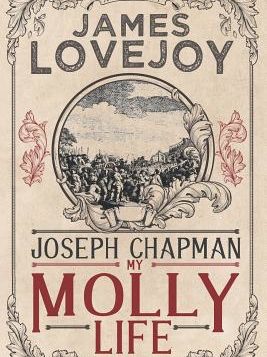 Joseph Chapman: My Molly Life
Joseph Chapman: My Molly Life
by James Lovejoy
Self-published. 361 pages, $16.99
JOSEPH CHAPMAN is a captivating historical novel that reveals the hidden life of gay men in 18th-century England. It follows the title character from childhood to his parents’ deaths and his stay in an orphanage, where he meets and falls in love with Chowder, a fellow orphan, and becomes apprenticed to a bookseller. He and Chowder are later imprisoned for “unnatural acts,” their fates uncertain.
Lovejoy has done extensive historical research and deploys it well, recreating London in the 18th century down to graphic details, such as the smell of trash and human waste in the streets.
Indeed, the most powerful impression one gets of this period is just how violent and exploitative it was. The doctor for Joseph’s mother, looking for a place for Joseph and his younger sister, fobs him off on the Little Eastcheap Free School, taking money from the headmaster for this referral. Conditions in the orphanage are brutal, with miserable food, poor clothing, and a feeling of oppression permeating the entire place. In addition, the headmaster, Mr. Peevers, uses his authority to take extreme liberties with the boys in his care. He forces Joseph to strip naked, then tries to “examine” the young man. Peevers has a small group of older boys who comply with his wishes and have free rein over the orphanage as a result. Joseph Chapman feels like a Dickens novel, only with a gay bent.
The homosexual world is another aspect of this era that is not usually mentioned in history books. Mr. Jackson, Joseph’s employer, lives with his lover Rowland as his adopted son. Once Jackson and Joseph discover they are kindred spirits, their friendship deepens, and the older man helps Joseph come to terms with his sexuality. Even in Jackson’s own home, however, they must be cautious. When Joseph finds Chowder and they begin a romance, Jackson offers them his bedroom for their encounters to ensure that their housekeeper won’t discover them. When Joseph is imprisoned on charges of sodomy, Jackson secretly aids him, afraid to do too much openly for fear of being tarnished by association.
After Joseph is sentenced to the pillory, a group of gay men surrounds the stage to protect him from the worst of the crowd. Joseph meets another gay man, Mr. Duckworth, while searching for Chowder. Duckworth propositions Joseph, and the younger man politely yet firmly declines. Later, on the run from the authorities, Joseph hides out in Duckworth’s palatial home with its all-male servants and worries how Duckworth will make him repay his hospitality. Later still, recovering from his injuries at the pillory, Duckworth touches him intimately, causing Joseph much resentment.
In all this sordidness, Joseph and Chowder’s relationship stands out as the novel’s most touching part. From their time at the orphanage they are emotionally and physically intimate, with Chowder softly holding Joseph as they sleep. Meeting each other after leaving the orphanage, they can barely keep their hands off each other, which leads to their being caught. Even after suffering terribly, their love thrives. Engaging characters, a compelling story, and a detailed historical setting all make this book a captivating reading experience.
_________________________________________________






